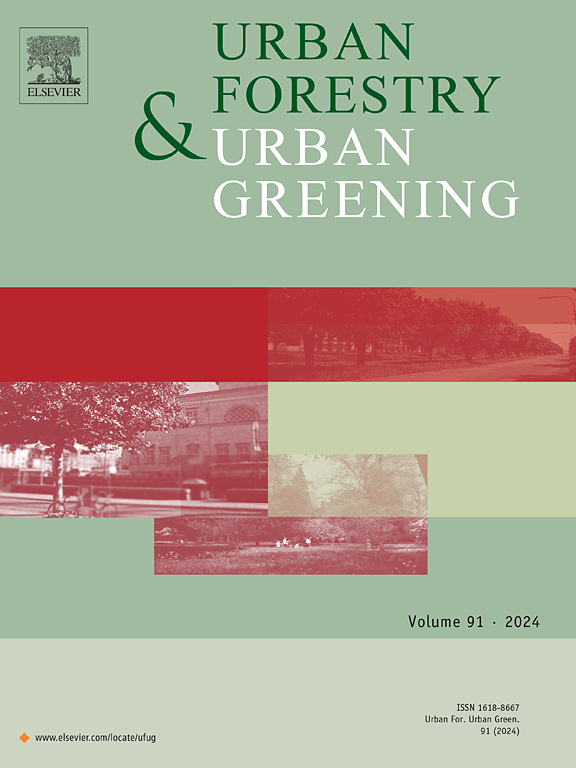美丽而非可持续性:对割草和野化的支持最受主观视觉吸引力的影响,而不是生态友好性
IF 6.7
2区 环境科学与生态学
Q1 ENVIRONMENTAL STUDIES
引用次数: 0
摘要
与被砍伐相比,留下的绿色空间对生物多样性、栖息地保护和心理健康都有积极的影响。近年来,英国各地的议会一直在宣布生态紧急状态,这引起了人们对采用生态意识土地管理(ECLM)实践的兴趣,例如减少割草和增加当地县绿地的野生化。然而,减少割草的尝试并不总是得到明确的支持。因此,重要的是要了解哪些关注和看法最能预测对ECLM实践的支持。目前的研究采用了一种在线调查设计,对居住、工作或访问达勒姆县的911名参与者进行了抽样调查,测量了对割草的支持、对野生动物的支持、对割草的关注以及对当地绿地的主观看法。研究发现,对整洁和环境的关注预示着对生态意识土地管理的支持,对整洁的关注越高,支持就会减少,对环境的关注越高,支持就会增加。此外,人们对修剪干净的绿地的看法,以及它们对环境的友好程度,以及它们对社会的可取程度,预测了他们对生态意识的土地管理实践是应该增加还是减少的看法。至关重要的是,本文的研究结果表明,当试图进一步增加对ECLM实践的支持时,整洁可能是最强大的感知和关注目标。因此,未来的研究可能会受益于调查如何影响对整洁的看法。同样,政策制定者可能需要将他们的战略从生态效益转向荒野带来的美学改善。本文章由计算机程序翻译,如有差异,请以英文原文为准。
Beauty not Sustainability: Support for mowing and rewilding is most influenced by subjective visual appeal not ecological friendliness
Greenspace that is left wilder compared to being mown has a positive impact on biodiversity, habitat protection, and psychological wellbeing. In recent years, Councils across the UK have been declaring an ecological emergency, creating an interest in adopting ecologically conscious land management (ECLM) practices, such as reduced mowing and increased wilding of local county green spaces. However, attempts to reduce mowing are not always met with unequivocal support. It is therefore important to understand what concerns and perceptions most strongly predict support for ECLM practices. The present research employed an online survey design with a sample of 911 participants who live, work, or visit County Durham, measuring support for mowing, support for wilding, mowing concerns, and subjective perceptions of local greenspaces. It was found that concerns around neatness and the environment predicted support for ecologically conscious land management, with higher concerns around neatness reducing support and higher environmental concerns increasing support. Additionally, people’s perceptions around how neat mown green spaces are, along with how environmentally friendly they are, and how socially desirable they are predicted their opinion on whether ecologically conscious land management practices should increase or decrease. Crucially, this paper’s findings indicate that neatness may be the most powerful perception and concern to target when trying to further increase support for ECLM practices. Future research may therefore benefit from investigating how to influence perceptions of neatness. Similarly, policymakers may need to shift their strategy away from the ecological benefit and towards the aesthetic improvements created by wilder land.
求助全文
通过发布文献求助,成功后即可免费获取论文全文。
去求助
来源期刊

Urban Forestry & Urban Greening
FORESTRY-
CiteScore
11.70
自引率
12.50%
发文量
289
审稿时长
70 days
期刊介绍:
Urban Forestry and Urban Greening is a refereed, international journal aimed at presenting high-quality research with urban and peri-urban woody and non-woody vegetation and its use, planning, design, establishment and management as its main topics. Urban Forestry and Urban Greening concentrates on all tree-dominated (as joint together in the urban forest) as well as other green resources in and around urban areas, such as woodlands, public and private urban parks and gardens, urban nature areas, street tree and square plantations, botanical gardens and cemeteries.
The journal welcomes basic and applied research papers, as well as review papers and short communications. Contributions should focus on one or more of the following aspects:
-Form and functions of urban forests and other vegetation, including aspects of urban ecology.
-Policy-making, planning and design related to urban forests and other vegetation.
-Selection and establishment of tree resources and other vegetation for urban environments.
-Management of urban forests and other vegetation.
Original contributions of a high academic standard are invited from a wide range of disciplines and fields, including forestry, biology, horticulture, arboriculture, landscape ecology, pathology, soil science, hydrology, landscape architecture, landscape planning, urban planning and design, economics, sociology, environmental psychology, public health, and education.
 求助内容:
求助内容: 应助结果提醒方式:
应助结果提醒方式:


